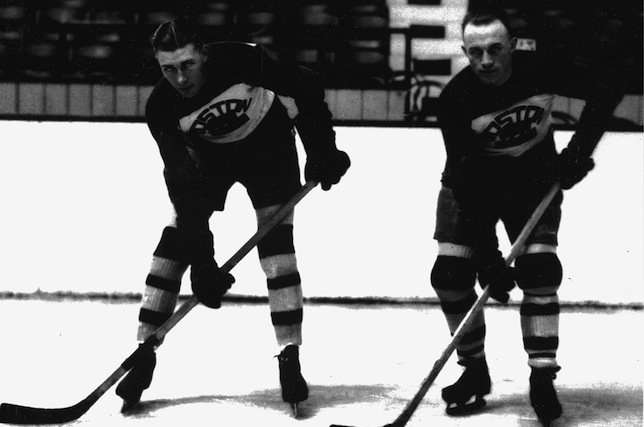In a Strange But True feature from THN magazine, Stan Fischler looks at legendary Bruin Eddie Shore's memorable journey to Montreal to play in a crucial game.
Those who knew him have said only Eddie Shore could pull off such an impossible feat – in this case, enduring a harrowing, death-defying, 22-hour trek from Boston to Montreal just so he could suit up for a game that his slumping Bruins desperately needed to win. The ordeal featured a traumatized Boston taxi driver, a challenging blizzard, a twice-ditched cab, frostbite and the likelihood of a $200 fine.
The saga began on the night of Jan. 2, 1929 when Shore’s friend drove him to Boston’s North Station where the train to Canada was taking on coal. When his pal’s car broke down en route, Shore tried to fix the engine, but was unsuccessful. After a few minutes, he glanced at his watch and realized that time was running out.
He’d be fined if he missed the train so he hustled off to the terminal, but it was too late. As the locomotive lurched out of the station, Bruins GM Art Ross suddenly and disturbingly realized Shore was missing. “I ran down the platform trying to jump on the last car of the train and just missed,” Shore said. “I knew I’d be in a jam if I blew that game.”
Aware his Bruins (6-7-2) were shorthanded because of injuries and not wanting to pay a missed-train fine, Shore was determined to reach Montreal in time for the Maroons game.
But a Nor’easter storm already had cancelled all flights and the next express train wouldn’t reach Canada until after game time the next evening.
Just when all seemed lost, Eddie found a cab driver willing to take $100 – big money in those days – to drive him the 350 miles to Canada. They took off just before midnight for an unimaginably dangerous expedition. The good news was Shore almost immediately found an all-night service station where chains were fitted for the tires. The bad news was they were absent such contemporary driving aids such as a defroster, paved superhighways, road patrols and sanders. By any odds, the pair, who at first alternated behind the wheel, seemed doomed for failure as the sleet storm turned into a blinding blizzard. “The poor cabby urged me to turn back to Boston,” Shore recalled.
But Eddie, the indomitable one, would have none of that, though it had become increasingly difficult to see anything through the snow-covered windshield. Fortunately the front window was an old-fashioned, split-glass design and that turned out to be a mixed blessing. “The snow froze my wiper,” Shore remembered, “and I had no visibility so I removed the top half of the windshield.”
Exposed to the icy blasts and snow, Eddie managed to steer the vehicle into the New Hampshire mountains. But just before dawn the tire chains broke. As luck would have it, he miraculously detected the lights of a construction camp where a worker put on a new set of chains.
By late morning and thoroughly exhausted, Shore pleaded with his driver to relieve him so he could take a nap. The chauffeur agreed, but soon the second pair of chains broke. The chauffeur lost control of the car, crashing it into a deep ditch somewhere along the Quebec countryside. Nobody was hurt so Eddie did the next best thing. He hiked down the road to a farmhouse for help.
According to Shore biographer C. Michael Hiam (Eddie Shore And That Old-Time Hockey), the farmer hitched up his sleigh and took the embattled pair to a railroad station where they caught a train to Montreal and then taxied to the Bruins headquarters at the Windsor Hotel.
Livid over the absence of his ace defender, Ross, who was holding forth with friends in the lobby, did a triple-take when Shore staggered in and nearly fainted at his feet. “Eddie’s eyes were bloodshot,” he said, “his face frostbitten and windburned, his fingers bent and set like claws after gripping the steering wheel so long. And he couldn’t walk straight.”
Ross told him to forget about the game, but Shore would have none of that namby-pamby nonsense. He played 56 out of the 60 minutes only because twice he was sent to the sin bin for two-minute penalties. A good 22 hours after Shore had chased his team’s Montreal-bound train down the station platform, Boston had won the game, 1-0.
Just to wrap up his Hollywood script, Shore scored the game’s only goal. As a gesture of good will, not to mention good management, Ross decided to rescind the $200 fine.
Stan Fischler is an award-winning writer and broadcaster who's covered the game since 1954. He's been a contributor to The Hockey News since 1955 and you can continue to find his Strange But True features in almost every issue. He's also produced the hockey newsletter, The Fischler Report, for the past 20 years. Fischler's latest book is Behind the Net: 101 Incredible Hockey Stories.
This feature originally appeared in the July 2013 edition of The Hockey News magazine. Get in-depth features like this one, and much more, by subscribing now.

Bad-Brains on January 4th, 2018 at 21:44 UTC »
Imagine being Eddie.
After all that you get to the game and you score the only goal to win the game.
Your hard work and determination paid off.
That must have been the most satisfying goal of all time.
Lstn2TownesVanZandt on January 4th, 2018 at 21:18 UTC »
Old time hockey?
A_Syrian_Named_Lia on January 4th, 2018 at 21:05 UTC »
"Okay now, who's giving ol' Eddie a ride home?"